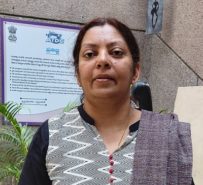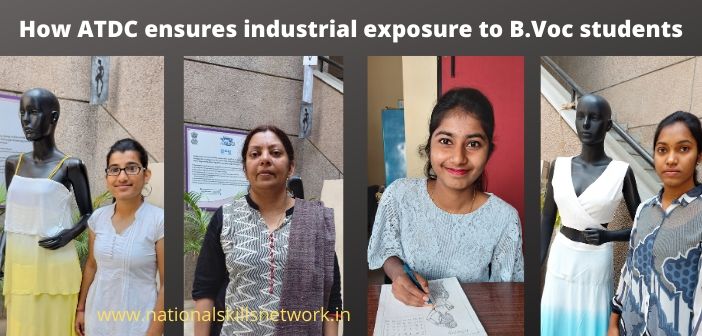Can you imagine learning how to swim within the four walls of a classroom? Or if someone teaches you how to paint orally and not provide you the color, paintbrush or the canvas? It is not possible. You cannot learn swimming unless you are out in the water and cannot learn how to paint unless you hold the paintbrush between your fingers.
Practical learning is essential for many skill-based courses. Of course, the theory is important, as it helps students understand the basics before they go ahead with experimenting. Practical or experiential learning with industry exposure is vital for students. It helps them familiarise themselves with the equipment or tools that they would be using once they are out in the industry. It encourages self-learning and helps the students gain confidence in their subject domain even before entering the market.

ATDC (Apparel Training and Design Centre) is accomplishing the task of imparting practical knowledge to its students through various courses it runs, especially through its long-term vocational degree programs. “We are currently running a 3-year vocational degree program, B.Voc. Here the students will learn in a more practical environment and get hands-on experience. ATDC runs 2 streams of B.Voc. program – Fashion Design and Retail and Apparel Manufacturing and Entrepreneurship”, said Ms. Kirti Mehta, Vice Principal, ATDC, Hyderabad.
Comprehensive Training Ecosystem in the Apparel sector

ATDC created a comprehensive training ecosystem for vocational training in the apparel industry in India. “We get to learn every aspect of fashion at ATDC. Right from how a fabric is made to the time it reaches a consumer as a complete garment”, said P. Vasavi Dharani, a 3rd-year B.Voc. student.
The courses and training at ATDC are designed in such a way that, students gain complete knowledge of a subject in the semester. Their 3-year vocational degree program is packed with many internships, industrial visits, and on-the-job-trainings. “Each semester, students are taken to the field to get practical exposure and learning. For example, in the 1st semester, they learn about fabric. So, we take them to meet weavers, to visit handloom textile industries, etc. Similarly, if they are learning about illustrations, idea generations, and advance pattern making, we take them to a design studio. With every theory course, there will be a practical learning environment for the students”, said Ms. Kirit Mehta.
 “To get hands-on experience in fashion designing, we not only learn cutting, pattern making, stitching, but also computer software like CAD. Whatever we learn in the class in the form of theory, we practice them on fabrics or on the computer”, said Ms. Vasavi.
“To get hands-on experience in fashion designing, we not only learn cutting, pattern making, stitching, but also computer software like CAD. Whatever we learn in the class in the form of theory, we practice them on fabrics or on the computer”, said Ms. Vasavi.

Sharing the experience of on-the-job training, Ms. Devaki, a 3rd-year B.Voc student said, “we are currently working at Big Bazaar and being trained in retail and visual merchandising. This training experience taught us how to design stores, mannequin dressing, management of stores, etc.

After gaining industrial exposure and with experience of working with big brands in India, Deekshika, a 1st-year B.Voc student at ATDC would like to pursue her Masters in Fashion Communication, after the completion of the course.
A new direction to skill development and training in the apparel industry
ATDC’s vocational degree programs are helping many rural youth fulfill their dreams, as the majority of its students are coming from rural areas. Its B.Voc. courses focus on the employability of the youth in the apparel sector, which operates in a globally competitive world.
B.Voc. program are designed and developed in such a way that, at the end of each year, a student can choose to take a break and yet get certified for the courses learned in those semesters. “Unlike regular degree courses like B.A., B.Com. and B.Sc., B.Voc. the course lets the student take a break after completion of the first year as well as the second year. At the end of each year, certification is provided. For example: after the completion of 1st year of B.Voc. the degree program, students are well-equipped with the knowledge required by the industry. They are given the certification of Fashion Designer, with NSQF level – 5”, said Ms. Kirit Mehta.
Related Article: How ATDC is preparing youth for the apparel industry through DDU-GKY and B.Voc courses – Read more: https://nationalskillsnetwork.in/ways-in-which-atdc-is-making-a-difference-in-the-apparel-training-in-india/
Similarly, at the end of the second year of the B.Voc. course, students are provided the certification of Export Executive, as they learn about exports, export quality, etc. And at the end of the 3rd year, students are certified for Boutique Management. All the courses and curriculum and certification are done by ATDC in association with Rajiv Gandhi National Institute of Youth Development (RGNIYD). RGNIYD offers the degree to the students.
As students learn and get certified in a number of streams, they can choose a career path that interests them. Based on their interest and capabilities, ATDC provides them with placements.
ATDC’s long-term vocational programs help students to gain critical knowledge and skillsets required in the apparel industry, to make them industry-ready by ensuring flexibility and employability of its students.













Comments 2